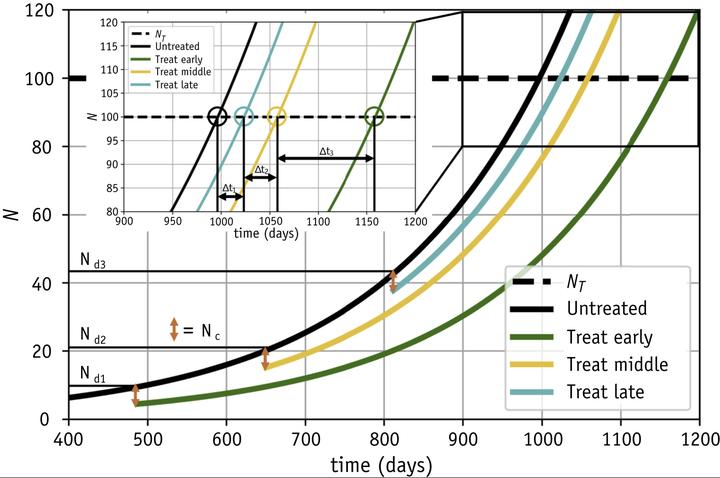Revisiting Null Hypothesis
 Change in overall survival is modulated by when an oligometastasis-directed intervention occurs and the effectiveness of the intervention
Change in overall survival is modulated by when an oligometastasis-directed intervention occurs and the effectiveness of the interventionIn the treatment of patients with metastatic cancer, the current paradigm states that metastasis-directed therapy does not prolong life. This paradigm forms the basis of clinical trial null hypotheses, where trials are built to test the null hypothesis that patients garner no overall survival benefit from targeting metastatic lesions. However, with advancing imaging technology and increasingly precise techniques for targeting lesions, a much larger proportion of metastatic disease can be treated. As a result, the life-extending benefit of targeting metastatic disease is becoming increasingly clear.
In this work, we suggest shifting this qualitative null hypothesis and describe a mathematical model that can be used to frame a new, quantitative null. We begin with a very simple formulation of tumor growth, an exponential function, and illustrate how the same intervention (removing a given number of cells from the tumor) at different times affects survival. Additionally, we postulate where recent clinical trials fit into this parameter space and discuss the implications of clinical trial design in changing these quantitative parameters.
Our model shows that although any amount of cell kill will extend survival, in many cases the extent is so small as to be unnoticeable in a clinical context or is outweighed by factors related to toxicity and treatment time.
Recasting the null in these quantitative terms will allow trialists to design trials specifically to increase understanding of the circumstances (patient selection, disease burden, tumor growth kinetics) that can lead to improved overall survival when targeting metastatic lesions, rather than whether targeting metastases extends survival for patients with (oligo-) metastatic disease.